常用英文习语
- 格式:doc
- 大小:30.00 KB
- 文档页数:7
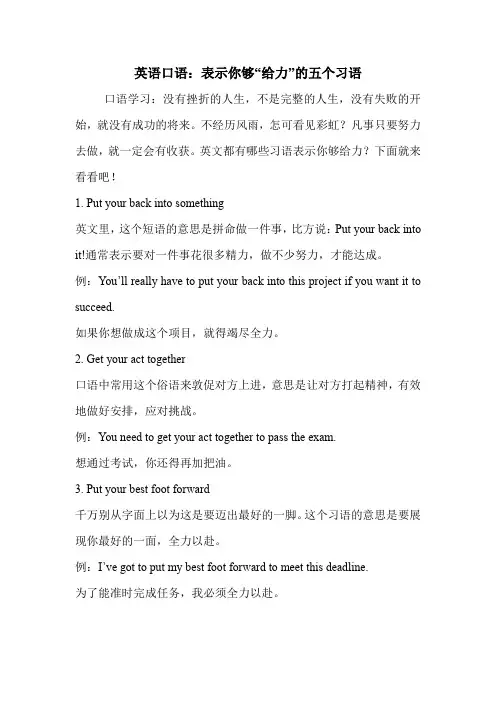
英语口语:表示你够“给力”的五个习语口语学习:没有挫折的人生,不是完整的人生,没有失败的开始,就没有成功的将来。
不经历风雨,怎可看见彩虹?凡事只要努力去做,就一定会有收获。
英文都有哪些习语表示你够给力?下面就来看看吧!1. Put your back into something英文里,这个短语的意思是拼命做一件事,比方说:Put your back into it!通常表示要对一件事花很多精力,做不少努力,才能达成。
例:You’ll really have to put your back into this project if you want it to succeed.如果你想做成这个项目,就得竭尽全力。
2. Get your act together口语中常用这个俗语来敦促对方上进,意思是让对方打起精神,有效地做好安排,应对挑战。
例:You need to get your act together to pass the exam.想通过考试,你还得再加把油。
3. Put your best foot forward千万别从字面上以为这是要迈出最好的一脚。
这个习语的意思是要展现你最好的一面,全力以赴。
例:I’ve got to put my best foot forward to meet this deadline.为了能准时完成任务,我必须全力以赴。
4. Give sth your best shot英文短语give sth a shot表示尝试做某事,那么,give sth your best shot 意思就是尽自己最大的努力做好某件事。
例:They lost, but at least they gave it their best shot.他们虽然失败了,但至少他们尽力了。
5. Put your heart and soul into sth这个说法和中文里全身心地投入到某件事情中,简直太像了。
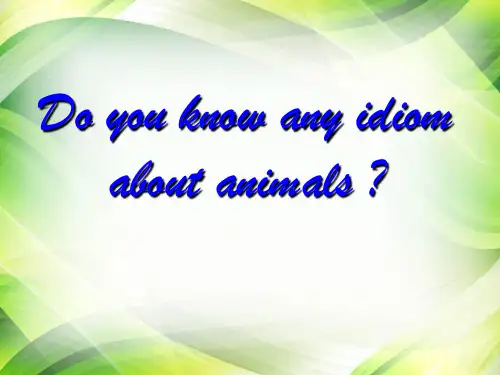
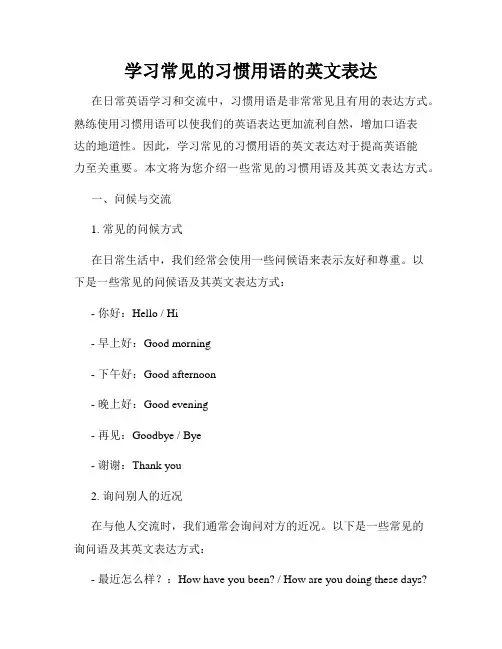
学习常见的习惯用语的英文表达在日常英语学习和交流中,习惯用语是非常常见且有用的表达方式。
熟练使用习惯用语可以使我们的英语表达更加流利自然,增加口语表达的地道性。
因此,学习常见的习惯用语的英文表达对于提高英语能力至关重要。
本文将为您介绍一些常见的习惯用语及其英文表达方式。
一、问候与交流1. 常见的问候方式在日常生活中,我们经常会使用一些问候语来表示友好和尊重。
以下是一些常见的问候语及其英文表达方式:- 你好:Hello / Hi- 早上好:Good morning- 下午好:Good afternoon- 晚上好:Good evening- 再见:Goodbye / Bye- 谢谢:Thank you2. 询问别人的近况在与他人交流时,我们通常会询问对方的近况。
以下是一些常见的询问语及其英文表达方式:- 最近怎么样?:How have you been? / How are you doing these days?- 你好吗?:How are you?- 有什么新鲜事吗?:What's new?二、描述与评论1. 描述人或事物在英语表达中,我们经常需要使用一些习惯用语来描述人或事物。
以下是一些常见的描述习语及其英文表达方式:- 外貌:as pretty as a picture(漂亮如画)- 性格:a piece of cake(温和、容易相处的)- 聪明:as sharp as a tack(聪明如锋利的图钉)- 快乐:as happy as a clam(非常快乐)2. 表示同意或不同意在交流中,表达自己的观点时,我们通常会使用一些习惯用语来表示同意或不同意。
以下是一些常见的表示同意或不同意的习语及其英文表达方式:- 同意:I couldn't agree more(我非常同意)- 不同意:I'm afraid I disagree(恐怕我不同意)三、日常生活1. 饮食方面习语在描述食物或饮食方面的习语中,我们可以使用一些常见的习语表达方式,如:- 一切顺利:smooth sailing(形容事情进行得很顺利)- 吃早饭:have breakfast(吃早饭的意思)- 慢慢吃:take your time(慢慢吃饭)2. 购物方面习语在购物过程中,我们通常也会使用一些习语来表达意愿或与商家进行交流。

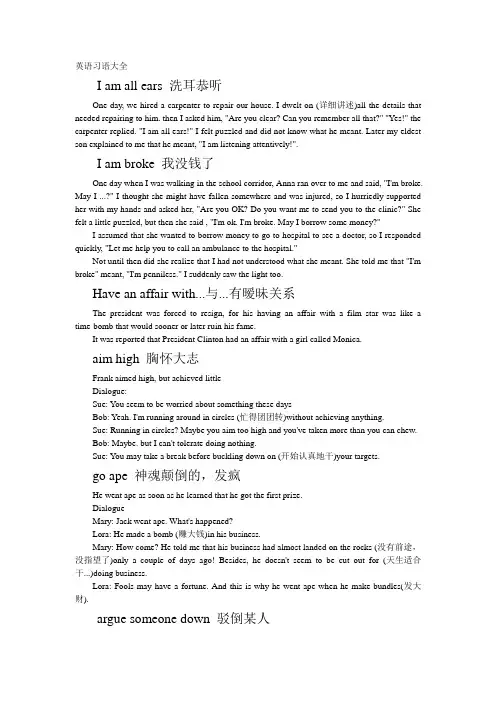
英语习语大全I am all ears 洗耳恭听One day, we hired a carpenter to repair our house. I dwelt on (详细讲述)all the details that needed repairing to him. then I asked him, "Are you clear? Can you remember all that?" "Yes!" the carpenter replied. "I am all ears!" I felt puzzled and did not know what he meant. Later my eldest son explained to me that he meant, "I am listening attentively!".I am broke 我没钱了One day when I was walking in the school corridor, Anna ran over to me and said, "I'm broke. May I ...?" I thought she might have fallen somewhere and was injured, so I hurriedly supported her with my hands and asked her, "Are you OK? Do you want me to send you to the clinic?" She felt a little puzzled, but then she said , "I'm ok. I'm broke. May I borrow some money?"I assumed that she wanted to borrow money to go to hospital to see a doctor, so I responded quickly, "Let me help you to call an ambulance to the hospital."Not until then did she realize that I had not understood what she meant. She told me that "I'm broke" meant, "I'm penniless." I suddenly saw the light too.Have an affair with...与...有暧昧关系The president was forced to resign, for his having an affair with a film star was like a time-bomb that would sooner or later ruin his fame.It was reported that President Clinton had an affair with a girl called Monica.aim high 胸怀大志Frank aimed high, but achieved littleDialogue:Sue: You seem to be worried about something these daysBob: Yeah. I'm running around in circles (忙得团团转)without achieving anything.Sue: Running in circles? Maybe you aim too high and you've taken more than you can chew.Bob: Maybe. but I can't tolerate doing nothing.Sue: You may take a break before buckling down on (开始认真地干)your targets.go ape 神魂颠倒的,发疯He went ape as soon as he learned that he got the first prize.DialogueMary: Jack went ape. What's happened?Lora: He made a bomb (赚大钱)in his business.Mary: How come? He told me that his business had almost landed on the rocks (没有前途,没指望了)only a couple of days ago! Besides, he doesn't seem to be cut out for (天生适合干...)doing business.Lora: Fools may have a fortune. And this is why he went ape when he make bundles(发大财).argue someone down 驳倒某人He has a glib tongue. Few people can argue him down.他有三寸不烂之舌。

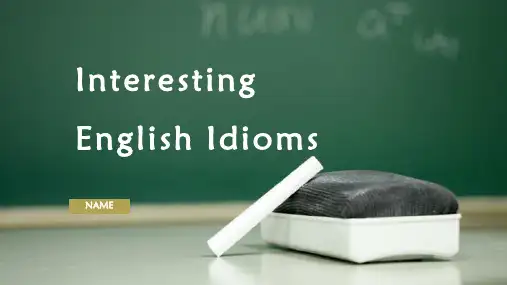
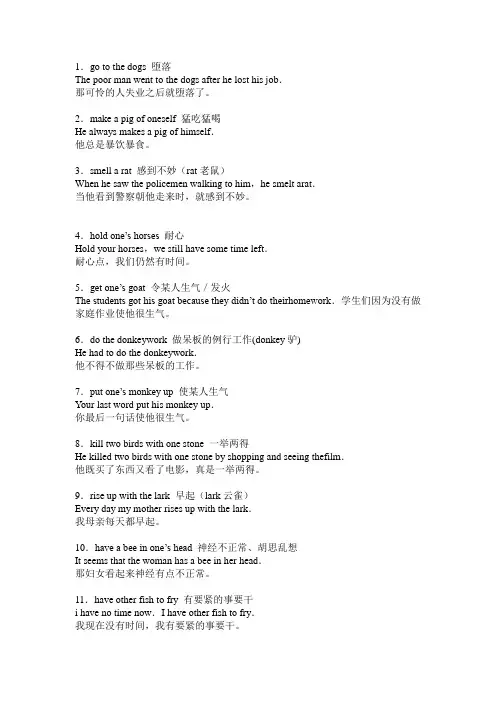
1.go to the dogs 堕落The poor man went to the dogs after he lost his job.那可怜的人失业之后就堕落了。
2.make a pig of oneself 猛吃猛喝He always makes a pig of himself.他总是暴饮暴食。
3.smell a rat 感到不妙(rat老鼠)When he saw the policemen walking to him,he smelt arat.当他看到警察朝他走来时,就感到不妙。
4.hold one’s horses 耐心Hold your horses,we still have some time left.耐心点,我们仍然有时间。
5.get one’s goat 令某人生气/发火The students got his goat because they didn’t do theirhomework.学生们因为没有做家庭作业使他很生气。
6.do the donkeywork 做呆板的例行工作(donkey驴)He had to do the donkeywork.他不得不做那些呆板的工作。
7.put one’s monkey up 使某人生气Y our last word put his monkey up.你最后一句话使他很生气。
8.kill two birds with one stone 一举两得He killed two birds with one stone by shopping and seeing thefilm.他既买了东西又看了电影,真是一举两得。
9.rise up with the lark 早起(lark云雀)Every day my mother rises up with the lark.我母亲每天都早起。
10.have a bee in one’s head 神经不正常、胡思乱想It seems that the woman has a bee in her head.那妇女看起来神经有点不正常。
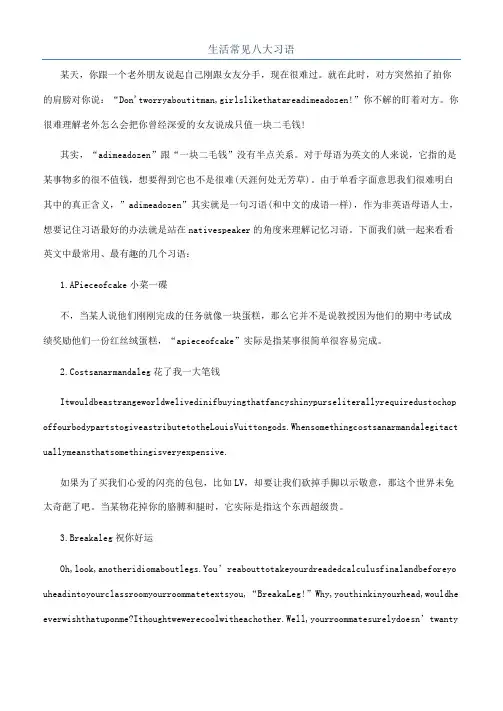
生活常见八大习语某天,你跟一个老外朋友说起自己刚跟女友分手,现在很难过。
就在此时,对方突然拍了拍你的肩膀对你说:“Don'tworryaboutitman,girlslikethatareadimeadozen!”你不解的盯着对方。
你很难理解老外怎么会把你曾经深爱的女友说成只值一块二毛钱!其实,“adimeadozen”跟“一块二毛钱”没有半点关系。
对于母语为英文的人来说,它指的是某事物多的很不值钱,想要得到它也不是很难(天涯何处无芳草)。
由于单看字面意思我们很难明白其中的真正含义,”adimeadozen”其实就是一句习语(和中文的成语一样),作为非英语母语人士,想要记住习语最好的办法就是站在nativespeaker的角度来理解记忆习语。
下面我们就一起来看看英文中最常用、最有趣的几个习语:1.APieceofcake小菜一碟不,当某人说他们刚刚完成的任务就像一块蛋糕,那么它并不是说教授因为他们的期中考试成绩奖励他们一份红丝绒蛋糕,“apieceofcake”实际是指某事很简单很容易完成。
2.Costsanarmandaleg花了我一大笔钱Itwouldbeastrangeworldwelivedinifbuyingthatfancyshinypurseliterallyrequiredustochop offourbodypartstogiveastributetotheLouisVuittongods.Whensomethingcostsanarmandalegitact uallymeansthatsomethingisveryexpensive.如果为了买我们心爱的闪亮的包包,比如LV,却要让我们砍掉手脚以示敬意,那这个世界未免太奇葩了吧。
当某物花掉你的胳膊和腿时,它实际是指这个东西超级贵。
3.Breakaleg祝你好运Oh,look,anotheridiomaboutlegs.You’reabouttotakeyourdreadedcalculusfinalandbeforeyo uheadintoyourclassroomyourroommatetextsyou,“BreakaLeg!”Why,youthinkinyourhead,wouldhe everwishthatuponme?Ithoughtwewerecoolwitheachother.Well,yourroommatesurelydoesn’twantyourbonestobreakwhilewalkingtoyourseatintheexamroomthat’sforsure.Breakalegactuallymeans goodluck!哦,快看,又一个与腿有关的习语。
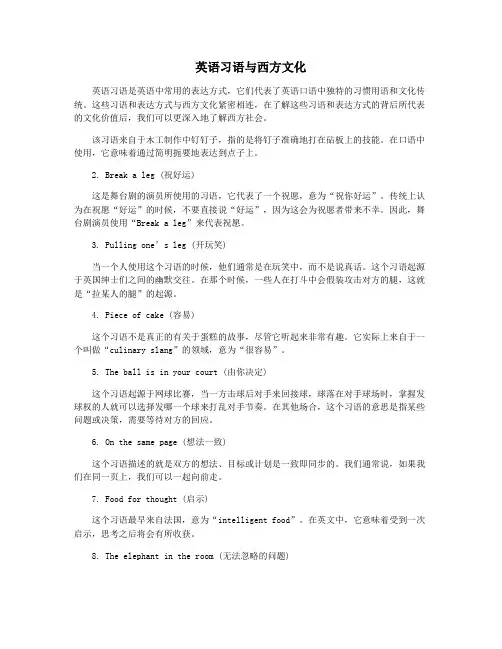
英语习语与西方文化英语习语是英语中常用的表达方式,它们代表了英语口语中独特的习惯用语和文化传统。
这些习语和表达方式与西方文化紧密相连,在了解这些习语和表达方式的背后所代表的文化价值后,我们可以更深入地了解西方社会。
该习语来自于木工制作中钉钉子,指的是将钉子准确地打在砧板上的技能。
在口语中使用,它意味着通过简明扼要地表达到点子上。
2. Break a leg (祝好运)这是舞台剧的演员所使用的习语,它代表了一个祝愿,意为“祝你好运”。
传统上认为在祝愿“好运”的时候,不要直接说“好运”,因为这会为祝愿者带来不幸。
因此,舞台剧演员使用“Break a leg”来代表祝愿。
3. Pulling one’s leg (开玩笑)当一个人使用这个习语的时候,他们通常是在玩笑中,而不是说真话。
这个习语起源于英国绅士们之间的幽默交往。
在那个时候,一些人在打斗中会假装攻击对方的腿,这就是“拉某人的腿”的起源。
4. Piece of cake (容易)这个习语不是真正的有关于蛋糕的故事,尽管它听起来非常有趣。
它实际上来自于一个叫做“culinary slang”的领域,意为“很容易”。
5. The ball is in your court (由你决定)这个习语起源于网球比赛,当一方击球后对手来回接球,球落在对手球场时,掌握发球权的人就可以选择发哪一个球来打乱对手节奏。
在其他场合,这个习语的意思是指某些问题或决策,需要等待对方的回应。
6. On the same page (想法一致)这个习语描述的就是双方的想法、目标或计划是一致即同步的。
我们通常说,如果我们在同一页上,我们可以一起向前走。
7. Food for thought (启示)这个习语最早来自法国,意为“intelligent food”。
在英文中,它意味着受到一次启示,思考之后将会有所收获。
8. The elephant in the room (无法忽略的问题)这个习语意味着一个显而易见、却无法表明的问题。
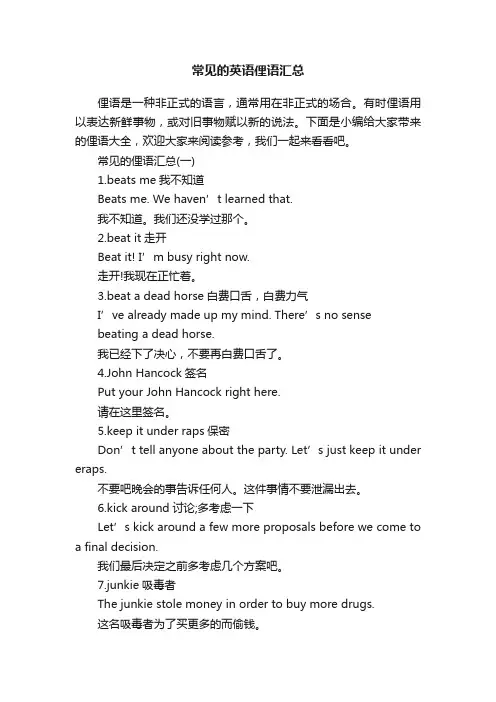
常见的英语俚语汇总俚语是一种非正式的语言,通常用在非正式的场合。
有时俚语用以表达新鲜事物,或对旧事物赋以新的说法。
下面是小编给大家带来的俚语大全,欢迎大家来阅读参考,我们一起来看看吧。
常见的俚语汇总(一)1.beats me我不知道Beats me. We haven’t learned that.我不知道。
我们还没学过那个。
2.beat it走开Beat it! I’m busy right now.走开!我现在正忙着。
3.beat a dead horse白费口舌,白费力气I’ve already made up my mind. There’s no sensebeating a dead horse.我已经下了决心,不要再白费口舌了。
4.John Hancock签名Put your John Hancock right here.请在这里签名。
5.keep it under raps保密Don’t tell anyone about the party. Let’s just keep it under eraps.不要吧晚会的事告诉任何人。
这件事情不要泄漏出去。
6.kick around讨论;多考虑一下Let’s kick around a few more proposals before we come to a final decision.我们最后决定之前多考虑几个方案吧。
7.junkie吸毒者The junkie stole money in order to buy more drugs.这名吸毒者为了买更多的而偷钱。
8.put away大吃大喝I’ve never seen anybody put away so much food and still look so thin.我从未见过这么能吃的人还这么瘦。
9.put a move on挑逗He tried to put the moves on her, but she turned him down.他想要挑逗她,但她拒绝了他。
口语常用习语Here/there + you /we +go/are 英语口语中Here/there + you /we +go/are这种短语极为常见。
从结构来说、这类习语有三个变量构成:地点指示是近指还是远指(here/there);第二,人称指示是对称还是自称(we/you);第三,谓语动词是动态还是静态(do/are)。
做一个简单的归纳。
大家先看几个例子:1. Here you go, Lucy. -Thank you.你在这里呀,露西。
-谢谢。
2. Postman: Yes, sir, Here you go.邮:是的,先生,这还有。
3. Sam: Here you go: I'm finished.萨姆:给你表格,我写完了。
4.Here you go 干得好我们刚刚讲过了“There you go.”“Here you go.”和“There you go.”听起来只有一字之差,所以很多人都会乱用,那么这二者倒底有什么区别呢?仔细区分,“Here you go.”指的是一件事情还在进行之中,而"There you go." 则是事情已经结束,例如店员正把你买的东西交付给你,他会说“Here you go.”而不是“There you go.”反之,如果东西己经到了你手上,则他会说的是“There you go.”此外,"Here you go." 和"There you go." 一样,也有鼓励别人的意思在里面,比如打棒球的时候,每次有人大棒一挥,老美就会兴奋地大叫"Here you go." 问题是他们为什么不说“There you go.”呢? 因为球在飞行当中算是一个过程,你还不知道结果,所以要用“Here you go.”会比较正确,而事实上老美也正是这样子用的喔!。
带"狗"习语知多少1. I am an old dog. 我已经是老朽了。
(You can’t teach an old dog new tricks.)2. He is a lucky dog. 他是个幸运儿。
3. He is a gay dog. 他是个快乐的人。
4. Every dog has his day. 凡人都有得意日。
5. That new singer is a dog. 那名新歌手不受观众欢迎。
6. Nobody but a dog would evict his own mother. 只有禽兽一般的人才会把生母赶出门。
7. He leads a dog’s life. 他过着牛马不如的生活。
8. Love me, love my dog. 爱我及乌。
9. My dogs are killing me. 我的双脚疼死了。
10. I would work like a dog to make good. 为达到目的,我要拼命干。
11. It’s raining cats and dogs. 天下着倾盆大雨。
12. At last the poor guy died like a dog. 最终,那个可怜的人潦倒而死。
13. Look, Tom is coming. He dresses like a dog’s dinner. 瞧,汤姆来了,他穿得考究极了。
14. Tom, put away your books and clothes. They look like a dog’s breakfast/dinner.汤姆,把你的书和衣服放好,乱七八糟的。
15. That man is young, but he is a top dog in his company. 那个人虽然年轻,在公司却位居要职。
相关短语:dog days 三伏天dogtrot 小跑dog-eared 书页折角的in the doghouse 失宠,失体面dog-collar (神父所戴的)硬白领 dog-paddle 狗爬式游泳dog-tired 极疲倦的dog-biscuit 喂狗的饼干(硬而厚的饼干)dog fish 角鲨(一种小鲨)dog-body 做苦工的人dogwood 水木,山茱萸dogcart 二轮单马车sea dog 海豹a case of dog eat dog 互相残害a dog in the manger 狗占马槽,占着茅坑不拉屎的人give sth to the dogs 丢弃某物,牺牲某物以自保Give a dog a bad name (谚)一旦给某人一个坏名声,他就永远洗不清。
【导语】离不开电脑、⼿机?不注意阅读姿势?还经常⽤⼿揉眼睛!繁忙的学习和⼯作中,你会给眼睛充分的休息和爱护吗?英⽂⾥,有许多和“眼睛”有关的习惯⽤语!今天,⼀起来盘点这些习语,希望你记得爱护眼睛哦!1. He's definitely giving you the eye!他的确是在向你抛媚眼!2. She was all eyes as I opened the box.她全神贯注地看我打开箱⼦。
3. He has been up to his eyes in work recently.他近来⼯作超忙。
4. He has a keen eye for detail.他特别注意细节。
5. He turned a blind eye to the messy room.他对房间的脏乱差熟视⽆睹。
6. During his talk, most of the delegates had one eye on the clock.他讲话时,⼤部分代表都偷偷看表。
7. We feasted our eyes on the colors of the autumn landscape.秋⽇绚丽的景⾊让我们⼤饱眼福。
8. I cried my eyes out when I found out they had left without saying goodbye.发现他们不辞⽽别,我不禁痛哭流涕。
9. You want me to apologize to him? In a pig's eye!你想让我跟他道歉?想都别想!10. I'm glad we see eye to eye on the choice of color scheme.很⾼兴我俩能在配⾊上想法⼀致。
~ A ~A bit muchIf something is excessive or annoying, it is a bit much.A day late and a dollar short(USA) If something is a day late and a dollar short, it is too little, too late.A fool and his money are soon partedThis idiom means that people who aren't careful with their money spend it quickly. 'A fool and his money are easily parted' is an alternative form of the idiom.A little bird told meIf someone doesn't want to say where they got some information from, they can say that a little bird told them.A little learning is a dangerous thingA small amount of knowledge can cause people to think they are more expert thanthey really are.eg. he said he'd done a course on home electrics, but when he tried to mend my table lamp, he fused all the lights! I think a little learning is a dangerousthingA OKIf things are A OK, they are absolutely fine.A penny for your thoughtsThis idiom is used as a way of asking someone what they are thinking about.A penny saved is a penny earnedThis means that we shouldn't spend or waste money, but try to save it.A picture is worth a thousand wordsA picture can often get a message across much better than the best verbal description.A poor man's somethingSomething or someone that can be compared to something or someone else, but is not as good is a poor man's version; a writer who uses lots of puns but isn't very funny would be a poor man's Oscar Wilde.A pretty pennyIf something costs a pretty penny, it is very expensive.A rising tide lifts all boatsThis idiom, coined by John F Kennedy, describes the idea that when an economy isperforming well, all people will benefit from it.A rolling stone gathers no mossPeople say this to mean that that a go-getter type person is more successful than a person not doing any thing.A stealIf something is a steal, it costs much less than it is really worth.A still tongue keeps a wise headWise people don't talk much.A1If something is A1, it is the very best or finest.Abide by a decisionIf you abide by a decision, you accept it and comply with it, even though you might disagree with it.Abject lesson(India) An abject lesson serves as a warning to others. (In some varieties of English 'object lesson' is used.)About as useful as a chocolate teapotSomeone or something that is of no practical use is about as useful as a chocolateteapot.About faceIf someone changes their mind completely, this is an about face. It can be used when companies, governments, etc, change their position on an issue.Above boardIf things are done above board, they are carried out in a legal and proper manner. Absence makes the heart grow fonderThis idiom means that when people are apart, their love grows stronger.Accident waiting to happenIf something is an accident waiting to happen, there's definitely going to be anaccident or it's bound to go wrong. ('Disaster waiting to happen' is also used.)Ace up your sleeveIf you have an ace up your sleeve, you have something that will give you an advantage that other people don't know about.Achilles' heelA person's weak spot is their Achilles' heel.Acid testAn acid test is something that proves whether something is good, effective, etc, ornot.Across the boardIf something applies to everybody, it applies across the board.Across the ditch(NZ) This idiom means on the other side of the Tasman Sea, used to refer to Australia or New Zealand depending on the speaker's location.Across the pond(UK) This idiom means on the other side of the Atlantic Ocean, used to refer to the US or the UK depending on the speaker's location.Actions speak louder than wordsThis idiom means that what people actually do is more important than what they say- people can promise things but then fail to deliver.Adam's appleThe Adam's apple is a bulge in the throat, mostly seen in men.Add fuel to the fireIf people add fuel to the fire, they make a bad situation worse.Add insult to injuryWhen people add insult to injury, they make a bad situation even worse.After your own heartA person after your own heart thinks the same way as you.Against the clockIf you do something against the clock, you are rushed and have very little time to do it.Against the grainIf doing something goes against the grain, you're unwilling to do it because itcontradicts what you believe in, but you have no real choice.Age before beautyWhen this idiom is used, it is a way of allowing an older person to do something first, though often in a slightly sarcastic way.Agony auntAn agony aunt is a newspaper columnist who gives advice to people having problems, especially personal ones.Ahead of the packIf you are ahead of the pack, you have made more progress than your rivals. Ahead of timeIf something happens ahead of time, it happens early or before the set time. Albatross around your neckAn albatross around, or round, your neck is a problem resulting from something you did that stops you from being successful.Alike as two peasIf people or things are as alike as two peas, they are identical.All alongIf you have known or suspected something all along, then you have felt this from the beginning.All and sundryThis idiom is a way of emphasising 'all', like saying 'each and every one'.All bark and no biteWhen someone talks tough but really isn't, they are all bark and no bite.All bark and no biteSomeone who talks a lot, but does nothing to back up their words-- like a dog thatbarks at strangers, but won't actually bite.All bets are off(USA) If all bets are off, then agreements that have been made no longer apply.All earsIf someone says they're all ears, they are very interested in hearing about something. All eyes on meIf all eyes are on someone, then everyone is paying attention to them.All fingers and thumbsIf you're all fingers and thumbs, you are too excited or clumsy to do somethingproperly that requires manual dexterity. 'All thumbs' is an alternative form of theidiom.All hat, no cattle(USA) When someone talks big, but cannot back it up, they are all hat, no cattle.('Big hat, no cattle' is also used.)All heartSomeone who is all heart is very kind and generous.All hell broke looseWhen all hell breaks loose, there is chaos, confusion and trouble.All in a day's workIf something is all in a day's work, it is nothing special.All in your headIf something is all in your head, you have imagined it and it is not real.All mod consIf something has all mod cons, it has all the best and most desirable features. It is an abbreviation of 'modern convenience' that was used in house adverts.All mouth and trousers(UK) Someone who's all mouth and trousers talks or boasts a lot but doesn't deliver.'All mouth and no trousers' is also used, though this is a corruption of the original. All of the aboveThis idiom can be used to mean everything that has been said or written, especially all the choices or possibilities.All over the map(USA) If something like a discussion is all over the map, it doesn't stick to the main topic and goes off on tangents.All over the placeIf something is completely disorganised or confused, it is all over the place.All over the shopIf something is completely disorganised or confused, it is all over the shop.All over the show.If something is all over the show, it's in a complete mess.An alternative to 'All over the shop'.All roads lead to RomeThis means that there can be many different ways of doing something.All setIf you're all set, you are ready for something.All skin and boneIf a person is very underweight, they are all skin and bone, or bones.All squareIf something is all square, nobody has an advantage or is ahead of the others.All talk and no trousers(UK) Someone who is all talk and no trousers, talks about doing big, important things, but doesn't take any action.All that glitters is not goldThis means that appearances can be deceptive and things that look or sound valuable can be worthless. ('All that glistens is not gold' is an alternative.)All the rageIf something's all the rage, it is very popular or fashionable at the moment.All the tea in ChinaIf someone won't do something for all the tea in China, they won't do it no matter how much money they are offered.All your eggs in one basketIf you put all your eggs in one basket, you risk everything at once, instead of trying to spread the risk. (This is often used as a negative imperative- 'Don't put all your eggs in one basket'. 'Have your eggs in one basket' is also used.)All's fair in love and warThis idiom is used to say that where there is conflict, people can be expected to behave in a more vicious way.All's well that ends wellIf the end result is good, then everything is good.All-singing, all-dancingIf something's all-singing, all-dancing, it is the latest version with the most up-to-date features.Alter egoAn alter ego is a very close and intimate friend. It is a Latin phrase that literally means 'other self'.Always a bridesmaid, never a brideIf someone is always a bridesmaid, never a bride, they never manage to fulfill their ambition- they get close, but never manage the recognition, etc, they crave. Ambulance chaserA lawyer who encourages people who have been in accidents or become ill to sue forcompensation is an ambulance chaser.AmenSome use 'Amen' or 'Amen to that' as a way of agreeing with something that has just been said.An old flameAn old flame is a person that somebody has had an emotional, usually passionate,relationship with, who is still looked on fondly and with affection.An ounce of prevention is worth a pound of cureThis expression means that is is better to try to avoid problems in the first place,rather than trying to fix them once they arise.And all that jazzThis idiom means that everything related or similar is included.Angry as a bearIf someone is as angry as a bear, they are very angry.('Angry as a bear with a sore foot' is also used.)Angry as a bullIf someone is as angry as a bull, they are very angry.Answers on a postcardThis idiom can be used to suggest that the answer to something is very obvious or that the person would really like to hear what people think.Ants in your pantsIf someone has ants in their pants, they are agitated or excited about something and can't keep still.Any port in a stormThis means that in an emergency any solution will do, even one that would normally be unacceptable.Any Tom, Dick or HarryIf something could be done by any Tom, Dick or Harry, it could be done by absolutely anyone.Apple of your eyeSomething or, more often, someone that is very special to you is the 'apple of your' eye.Apron stringsA man who is tied to a woman's apron strings is excessively dependent on her,especially when it is his mother's apron strings.Argue the toss(UK) If you argue the toss, you refuse to accept a decision and argue about it.Arm and a legIf something costs an arm and a leg, it is very expensive.Armchair criticAn armchair critic is someone who offers advice but never shows that they couldactually do any better.Armed to the teethIf people are armed to the teeth, they have lots of weapons.Around the clockIf something is open around the clock, it is open 24 hours a day. For example, anairport is open around the clock.Arrow in the quiverAn arrow in the quiver is a strategy or option that could be used to achieve yourobjective.As a ruleIf you do something as a rule, then you usually do it.As cold as iceThis idiom can be used to describe a person who does not show any emotion.As cold as stoneIf something is as cold as stone, it is very cold. If a person is as cold as stone, they are unemotional.As cool as a cucumberIf someone is as cool as a cucumber, they don't get worried by anything.As mad as a hatterThis simile means that someone is crazy or behaves very strangely. In the past many people who made hats went insane because they had a lot of contact with mercury. As much use as a chocolate fire-guard.A fire-guard is used in front of a fireplace for safety. A chocolate fire-guard is of no use.An alternative to 'As much use as a chocolate teapot'.As much use as a chocolate teapotSomething that is as much use as a chocolate teapot is not useful at all.As much use as a handbrake on a canoeThis idiom is used to describe someone or something as worthless or pointless.As neat as a new pinThis idiom means tidy and clean.As one manIf people do something as one man, then they do it at exactly the same time or incomplete agreement.As the actress said to the bishop(UK) This idiom is used to highlight a sexual reference, deliberate or accidental.As the crow fliesThis idiom is used to describe the shortest possible distance between two places.As you sow, so shall you reapThis means that if you do bad things to people, bad things will happen to you, or good things if you do good things.Asleep at the switchIf someone is asleep at the switch, they are not doing their job or taking theirresponsibilities very carefully. 'Asleep at the wheel' is an alternative.Asleep at the wheelIf someone is asleep at the wheel, they are not doing their job or taking theirresponsibilities very carefully. 'Asleep at the switch' is an alternative.At a loose end(UK) If you are at a loose end, you have spare time but don't know what to do with it. At a snail's paceIf something moves at a snail's pace, it moves very slowly.At arm's length(India) If something is at arm's length, it is very close to you.At arm's lengthKeep somebody at arm's length means not allowing somebody to be become tofriendly with you or close to you.At cross purposesWhen people are at cross purposes, they misunderstand each other or have different or opposing objectives.At death's doorIf someone looks as if they are at death's door, they look seriously unwell and might actually be dying.At each other's throatsIf people are at each other's throats, they are fighting, arguing or competingruthlessly.At full tiltIf something is at full tilt, it is going or happening as fast or as hard as possible.If a criminal is at large, they have not been found or caught.At loggerheadsIf people are at loggerheads, they are arguing and can't agree on anything.At loose ends(USA) If you are at a loose end, you have spare time but don't know what to do with it.At oddsIf you are at odds with someone, you cannot agree with them and argue.At seaIf things are at sea, or all at sea, they are disorganized and chaotic.At the bottom of the totem pole(USA) If someone is at the bottom of the totem pole, they are unimportant. Opposite is at the top of the totem pole.At the coalfaceIf you work at the coalface, you deal with the real problems and issues, rather than sitting in a office discussing things in a detached way.At the drop of a hatIf you would do something at the drop of a hat, you'd do it immediately.At the end of the dayThis is used to mean 'in conclusion' or 'when all is said and done'.At the end of your rope(USA) If you are at the end of your rope, you are at the limit of your patience orendurance.At the end of your tether(UK) If you are at the end of your tether, you are at the limit of your patience orendurance.At the foreIn a leading positionAt the top of my lungsIf you shout at the top of your lungs, you shout as loudly as you possibly can.At your wit's endIf you're at your wit's end, you really don't know what you should do about something, no matter how hard you think about it.At your wits' endIf you are at your wits' end, you have no idea what to do next and are very frustrated. Average JoeAn average Joe is an ordinary person without anything exceptional about them. Avowed intentIf someone makes a solemn or serious promise publicly to attempt to reach a certain goal, this is their avowed intent.Awe inspiringSomething or someone that is awe inspiring amazes people in a slightly frightening but positive way.AWOL stands for "Absent Without Leave", or "Absent Without Official Leave".Orignially a military term, it is used when someone has gone missing without telling anyone or asking for permission.Axe to grindIf you have an axe to grind with someone or about something, you have a grievance,a resentment and you want to get revenge or sort it out. In American English, it is 'ax'. grievance/ ˈgriːvns; ˋɡrivəns/ n ~ (against sb) real or imagined cause for complaint or protest (used esp with the vs shown) 委屈, 苦衷, 牢骚, 不满, 怨恨(尤与下列示例中动词连用): inviting the members to air (ie express) their grievances 请成员们诉说苦衷* He'd been harbouring/nursing a grievance against his boss. 他一直对老板心怀不满. * Management agreed to settle the workers' grievances. 资方同意处理工人的申诉.。
经典的美国习语语音、词汇和语法是交流的基石,习语则会让你锦上添花。
今天我给大家带来了美国习语,希望能够帮助到大家,下面我就和大家分享,来欣赏准备一下吧。
美国习语第28街A black sheepA white lie黑颜色和白颜色往往是对立的。
黑代表黑夜和邪恶,而白象征着日光、善良或美德。
在美国好莱坞早期那些无声电影里,导演往往给英雄人物戴上白帽子,而给坏蛋戴黑帽子。
这样,连十岁的孩子一看就马上知道谁是好人,谁是坏人。
白帽和黑帽就这样逐渐成了一个习惯的说法,也就是white hats and black hats.White hats and black hats 就代表好人和坏人。
黑和白这两个字black and white 经常在美国的成语和俗语中出现。
可是,它们并不一定像好人、坏人那样黑白分明。
有时候,黑还具有肯定和积极的意思。
例如,对一个做生意的人来说in the black 就意味着赚钱,而不是亏本。
今天,我们要讲两个和black and white 这两个字有关的成语。
首先我们来讲一个和black有关的常用语a black sheep.Black 当然是指黑颜色,而sheep 是一头羊的意思。
一头黑颜色的羊a black sheep 指的是一个给他周围的人带来耻辱的人。
请听下面这个例子:例句-1:Uncle Joe is the black sheep in the family. Instead of getting a job,all he does is drink too much,gamble away any money he gets and chase after women.这句话翻成中文就是:乔叔叔是他们家的败家子。
他不是去找个工作,而是成天喝酒,有了一点钱就去赌,还老是玩女人。
我们再来举一个例子:例句-2:We all thought my youngest brother was the black sheep in our family. In fact he was in so much trouble he ran away to Australia. But he started a new life there,married a wonderful girl,and now hes a millionaire.这句话的意思是:我们都认为我最小的弟弟是我们家的败家子。
一百多句英语教师课堂常用语大全1. “Good morning/afternoon, class! How are you today?” 这句就像日常打招呼一样,很亲切地开启课堂。
2. “Let's start our class. Are you all ready?” 简单直接,问问学生有没有准备好上课。
3. “Open your books to page [X].” 这是课堂上经常会用到的指令,让学生翻到指定的页码。
4. “Who can read this sentence for us?” 鼓励学生主动站起来读句子。
5. “Great job! Your pronunciation is very good.” 当学生读得不错的时候,及时给予表扬。
6. “Now, let's listen to the tape and repeat.” 利用听力材料,让学生跟读,提升口语能力。
7. “I don't understand what you said. Can you say it again?” 如果学生表述不清楚,温和地让他再说一次。
8. “Don't be shy. Everyone can make mistakes.” 当有学生害怕犯错不敢回答时,可以这么鼓励。
9. “You are so clever! How did you get this answer?” 对回答出较难问题的学生,夸他聪明并问问思路。
10. “Work in pairs and practice this dialogue.” 安排学生两两合作练习对话。
11. “Time's up. Stop talking and look at me.” 小组活动时间结束时,让学生停止交流看向自己。
12. “Which group wants to show your performance first?” 小组练习后,询问哪个小组想先展示。
1 Common idioms Action speaks louder than words We can know your true intentions by what you do than what you say. A related idiom is, words are cheap.
Add insult to injury To make a bad situation worse. It’s the same as the Chinese proverb on throwing stone at someone who has fallen into a well.
An arm and a leg Very expensive. “The latest Apple iPhone costs me an arm and a leg.”
At the drop of a hat Something that happens quickly or easily without much prompting or encouragement. “He quotes Confucius at the drop of a hat.”
Back to the drawing board When your project or idea fails, you decide to start all over.
Ball is in your court The next step is up to you. “We have completed the proposal. The ball is in your court on when to proceed.”
Barking up the wrong tree Looking in the wrong place. Accusing the wrong person
Beat around the bush Not speaking directly about the issue. Not coming straight to the point. 2
Best of both worlds To enjoy all the advantages and benefits. “If you enrol in Qingdao University, you enjoy the best of both worlds – it is near your home and you get a first-class education.”
Bite off more than you can chew To take on a task that is too big or too difficult to complete.
Blessing in disguise Something good that you didn’t recognised at first. “Losing the match was a blessing in disguise for the team as it made them train harder.”
Burn the midnight oil To work late into the night, to put in a lot of effort. “To do well in this exam, we have to burn the midnight oil.”
Cheaper by the dozen Things are cheaper when you buy them in large volumes rather than piece by piece.
Cross that bridge when you come to it Deal with a problem only when it becomes necessary.
Cry over split milk To complain about a bad situation in the past which you can’t undo.
Curiosity kills the cat To continue finding out more about something will result in an unpleasant situation for you. Related idiom is ignorance is bliss, meaning it’s sometimes better not to know something. 3
Cutting corners Doing something badly to save money. “The developer cut corners when building the apartments. The pipes, for instance, are made of plastic and are starting to crack.”
Don’t count your chickens before the eggs have hatched Don’t make plans for something that might not happen.
Don’t judge a book by its cover You cannot say a person or a thing is good or bad simply by looking at it. Don’t judge from appearance alone.
Don’t put all your eggs in one basket Do not put all your resources in one project or business.
Every cloud has a silver lining Be optimistic, even difficult times will lead to better days.
Far cry from Very different from. “The final plan is a far cry from the original proposal.”
Feeling under the weather Feeling sick.
Give the benefit of the doubt Believe someone’s statement, without asking for proof.
Hear it on the grapevine To hear rumours about something or someone. “I heard it on the grapevine that he’s planning to divorce his wife.”
Hit the nail on the head Do or say something exactly right 4
Hit the sack To go to bed. “After a long day in the office, I’m ready to hit the sack the moment I get home.”
Hot potato ? A topic or an issue that many people are talking about and which they don’t agree on. “Normalizing relationship with Cuba is a hot potato in Washington’s political circle.”
In the heat of the moment Overwhelmed by what is happening in the moment. “In the heat of the moment, I lost my head and punched him in the face.”
It takes two to tango An action that needs more than one person to do.
Jump on the bandwagon Join a popular trend or activity. “When share prices were climbing, ordinary folks jumped on the bandwagon by putting in their life savings into stocks.”
Kill two birds with one stone To do two different things at the same time.
Last straw The final problem or difficulty that makes you give up.
Let sleeping dogs lie Do not disturb a situation as it is because it would result in trouble or complications.
Let the cat out of the bag To reveal information that was previously hidden.